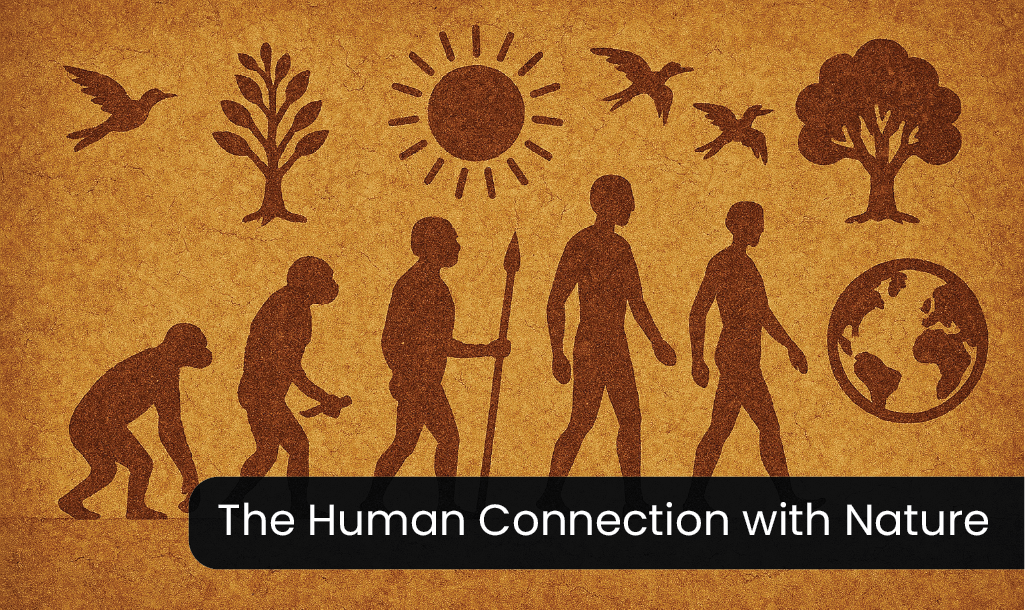For centuries, humans lived in harmony with nature, understanding its rhythms, respecting its cycles, and thriving within its balance. Nature wasn’t just a resource—it was a way of life. Every element of survival, from food and shelter to medicine and spiritual growth, was deeply intertwined with the land. But somewhere along the way, we drifted. Modern advancements brought comfort and convenience, yet they also distanced us from this connection. Now, as we face climate crises and resource depletion, it’s time to ask—can we bridge the gap between ancient wisdom and modern realities?
A Timeless Relationship with Nature
Human survival has always depended on nature’s generosity. Rivers provided water; forests offered food and medicine, and fertile soil sustained civilizations. Indigenous cultures across India understood this delicate balance, treating nature as both a provider and a protector. They knew that taking more than needed would only lead to ruin—a lesson modern society has often overlooked.
Tribes such as the Gond, Santhal, Bhil, and Toda have preserved ecological wisdom for generations. Their deep understanding of forests, water conservation, and medicinal plants has helped them coexist with nature sustainably. The Bishnoi community of Rajasthan, for example, is known for its deep-rooted environmental conservation practices, even sacrificing their lives to protect trees from being cut down centuries ago. Similarly, the Warli tribe of Maharashtra expresses their reverence for nature through their famous paintings, which depict a harmonious connection between humans and the environment.
Lessons from Indian Ancient Civilizations
India’s ancient civilizations flourished due to their profound understanding of nature. The Indus Valley Civilization developed advanced drainage systems and urban planning techniques that prioritized sustainability. The Vedic texts emphasized the importance of living in harmony with nature, advocating for a balance between consumption and preservation. The concept of Rishi Krishi, an ancient Indian farming technique that aligns agricultural practices with cosmic rhythms, is still relevant today.
Ayurveda, one of the world’s oldest medicinal systems, is deeply rooted in nature. It relies on plants, minerals, and holistic practices to maintain health, proving that ancient Indians recognized the importance of a symbiotic relationship between humans and their surroundings. Meanwhile, Vrikshayurveda, the ancient science of plant life, outlined sustainable farming techniques such as crop rotation, organic fertilizers, and companion planting—long before modern agricultural methods adopted similar principles.
Yet history also warns us of the dangers of neglecting nature’s balance. The overexploitation of resources and deforestation have led to environmental challenges in the past, just as they do today. The ancient wisdom of Indian civilizations serves as both inspiration and caution for modern society.
Nature as a Teacher: What We Can Learn
Despite all our technological advancements, nature remains our most significant mentor. Indian philosophies have long emphasized observing and learning from the environment rather than attempting to dominate it. Concepts like Prakriti (nature) and Purusha (human consciousness) from Indian philosophy highlight the interconnectedness of humans and the natural world. The practice of Vana Yatra (forest pilgrimage) encouraged sages and seekers to spend time in the wilderness, learning directly from nature’s rhythms.
At Moggs Estates, we believe in reviving these principles. Our sustainable farmland projects offer a way to reconnect with nature while preserving its integrity. Initiatives like Moggs Terra Hill are designed to blend investment opportunities with eco-conscious living, ensuring that land is nurtured, not exploited. Through sustainable farming techniques, water conservation systems, and green landscaping, we create spaces where both people and nature can thrive together.
Rebuilding the Human-Nature Connection
In today’s fast-paced world, rebuilding our connection with nature requires intentional effort. Here’s how we can start:
Practicing Sustainable Living: Reduce waste, conserve water, and choose eco-friendly alternatives. Small actions lead to significant change.
Learning from Indigenous Wisdom: Supporting and studying traditional Indian conservation methods can offer real solutions to modern environmental challenges.
Investing in Green Spaces: Projects like Moggs Terra Hill provide opportunities to reconnect with nature while securing long-term financial growth.
Rewilding Our Lifestyles: Spend time in nature, grow your food, and observe seasonal changes. These small efforts can reignite our bond with the land.
Ethical Consumption: Making mindful choices in food, clothing, and daily habits can reduce our ecological footprint.
Advocating for Change: Supporting environmental policies and encouraging businesses to adopt sustainable practices can drive collective progress.
Conclusion
Our ancestors saw the earth as a living entity—one that needed care, not exploitation. They understood that human prosperity and environmental well-being must go hand in hand. Today, as we face unprecedented environmental challenges, perhaps the key to our future lies in the wisdom of the past.
At Moggs Estates, we believe that investing in farmland and preserving natural ecosystems is more than just a financial decision—it’s a commitment to a future where progress and sustainability coexist. Our farmlands are not just investments; they are a step toward rebuilding our timeless bond with nature.
The world doesn’t need passive observers—it needs action-takers—those who seek not just success but purpose. By embracing ancient Indian wisdom and conscious living, we don’t just create a better world—we create a better version of ourselves, one choice at a time.




